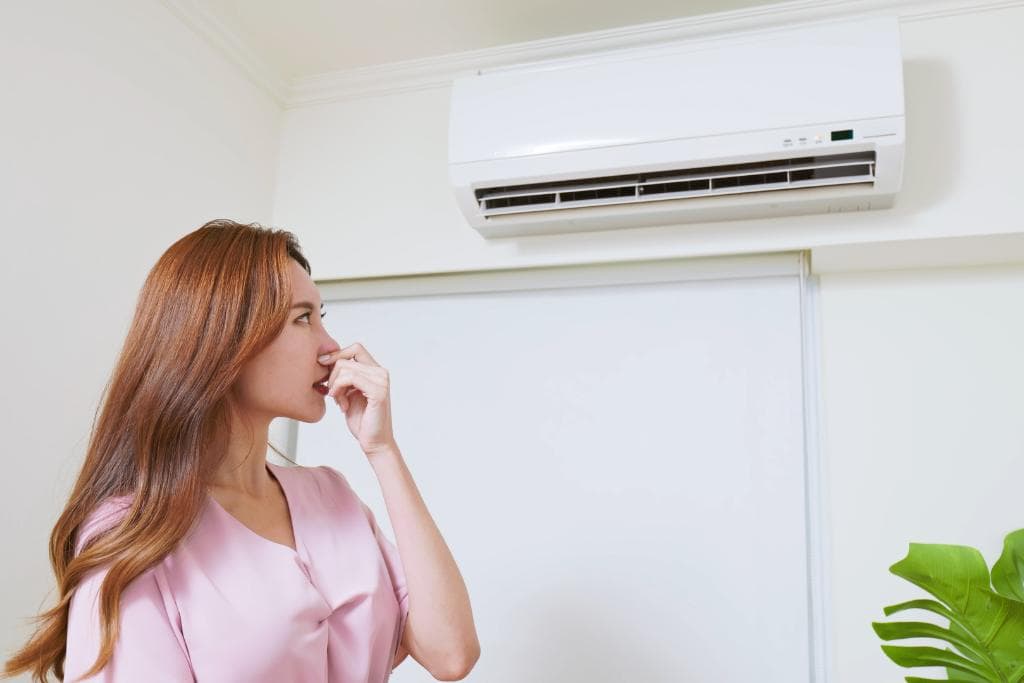
One day, you’re overwhelmed by your house’s heat and crank the AC. But shortly after, you notice an unpleasant smell indoors. After searching for its source, you trace it to your air vents. Finally, you figure it out: the cold air supplied by your AC smells musty!
This concerns you because your air conditioner isn’t supposed to have this mildew-like scent. Even worse, it might mean that you need to pay for an expensive repair! Either way, you don’t want to turn your system on until the issue’s fixed. And that’s making it difficult to get comfortable indoors! So, what should you do? Well, we can tell you!
Read on to learn what to do if your AC smells musty, the causes of the smell, and how to prevent it in the future. And if you can’t take that stuffy stench, SuperTech is the top company for anyone in or around Baltimore! Our technicians have worked on hundreds of systems, and we can figure out why yours smells musty. Just call or schedule online!
I- How Your Air Conditioning System Works
First, we briefly want to explain how your air conditioner’s cooling process works. This way, when we tell you why it may smell musty, those reasons will make more sense.
Perhaps to your surprise, your air conditioner doesn’t create cool air. Instead, once your thermostat senses that your house’s temperature doesn’t match its display, it sends a signal to your outdoor condenser unit. Then, the condenser receives electricity from a device called the capacitor that powers it on. From there, the condenser’s compressor transfers a substance known as refrigerant to your indoor unit’s evaporator coil.
The refrigerant’s pressure and temperature are lowered inside the evaporator coil, cooling the coil down. Meanwhile, your house’s warm air is pulled into the indoor unit through your supply ducts and blown over the coil. As a result, this allows the refrigerant to remove the heat from the air. To complete the process, the cooled air is returned to your home while the hot refrigerant is returned to the condenser. The outdoor unit’s fan then blows the refrigerant’s heat outside.With AC air circulating through your house, you don’t want an unpleasant stench stuck in its path. So, what do you do about the smell?First, you need to distinguish musty air conditioning smells from other ones that aren’t an issue…
II- Symptoms Of Musty AC Smells
In terms of a musty-smelling air conditioner, there are typically three levels of concern:
When you turn your AC on for the first time, it may smell musty for a day or two. But it often goes away after that. As long as you remembered your AC maintenance, you shouldn’t have anything to worry about.
- On the other hand, the smell may not go away after a few days. Instead, your air conditioner always smells musty when it runs. In this situation, something’s probably not working right.
- Lastly, temperature and humidity contribute to bio-growth. So if your home’s temperature and humidity levels are not regulated properly, your house could become a breeding ground for bio-growth. This could be due to issues with your air that go beyond your air conditioner, such as poor ductwork or a lack of a dehumidifier. Also, remember that bacteria aren’t safe to breathe and can be more harmful to people with respiratory issues.
III- What Should I Do If My AC Smells Musty?
Most issues causing your AC system to smell musty will require a professional inspection and possibly an expensive repair. However, there are several things you can try for yourself that may solve the issues and save you some money.
Step One: Change Your AC Filter
AC filters are essential for your system to provide efficient air, as they catch dirty material (such as dust and bacteria) to stop it from flowing into your house’s rooms. That said, they will eventually become so filthy that they no longer work. Therefore, they need to be changed every one to three months. If your old, dirty filters stay in place, not only will they make the air you breathe less healthy, but they will also decrease your system’s efficiency!

So if your AC smells musty, think back to the last time you changed your air filter: if it’s been several months, check it and replace it if it looks filthy. And if you don’t feel comfortable changing your filters, schedule an appointment for a SuperTech filter changeout!
Step Two: Make Sure Your House’s Airflow Isn’t Restricted
Homeowners often unintentionally block their supply and return vents with items such as furniture or tables. Additionally, many close the vents in rooms they don’t occupy as frequently. However, restricted vents can heavily restrict airflow and decrease the efficiency of your air conditioner, worsening your house’s humidity and producing more problematic bacteria.
For this reason, check if you have an AC vent behind or underneath items in your house, and make sure they are all open!
Step Three: Seal Your Leaky Ducts
While it can be tricky, you could look for openings in your ducts and temporarily seal them. We highly recommend getting permanent sealings as well, which you should leave to professionals. However, for a quick seal, grab some silver tape and use it to cover any leaks you find in your ductwork until you can get someone to come out and close them permanently. Do not use duct tape!
Step Four: Get Summer Maintenance Done
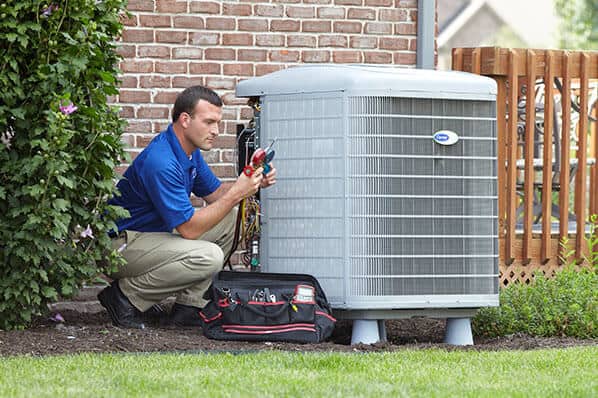
To run efficiently for several decades, air conditioners should receive routine maintenance before the hotter seasons begin. So if it’s been about a year since yours was serviced, don’t forget to have it tuned up if you don’t want an unpleasant odor in your house! And if you get your maintenance from SuperTech, we’ll slap a service record sticker on your system that gives you the exact date of our last visit. That way, you can always know when your air conditioner last received maintenance.
IV- Causes Of Your AC Smelling Musty
Unfortunately, none of those fixes got rid of the musty smell. Now, there’s nothing else you can do. It’s time to schedule a professional AC repair.
In that case, it’d be wise to tell you about the common causes of your air conditioner smelling musty. That way, if you hire a professional to inspect your system, what they say about what created the stench will seem more familiar.
1. Bio-Growth On The Evaporator Coil & Its Cabinet
During the fall and winter – aka the long stretch in which you do not use your air conditioner – your system can become coated in dirt, dust, and other unsafe material. This can lead to bio-growth on the evaporator coil, which, as we said, the air from your house blows over to get cooled.
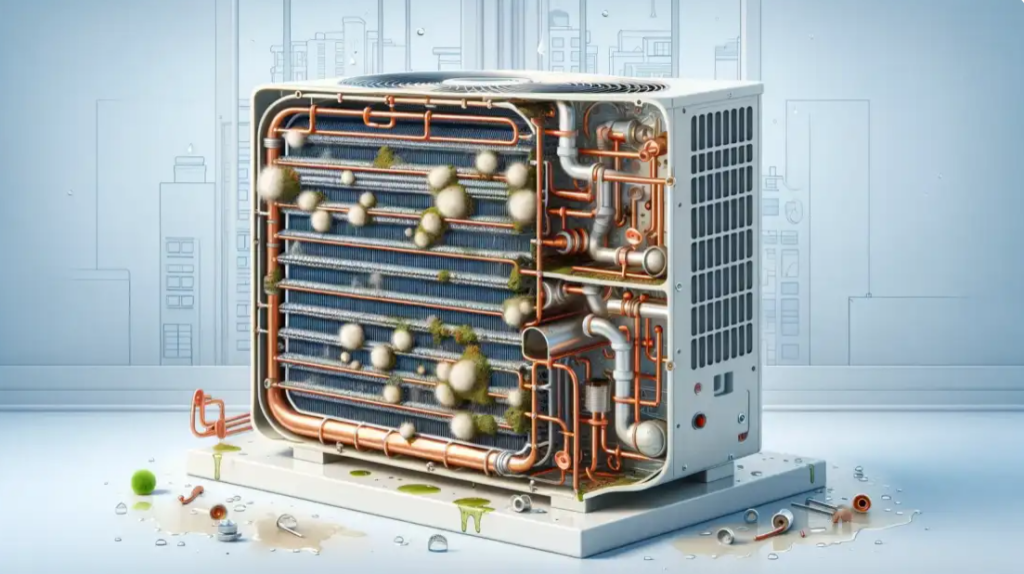
Two things may happen as a result of this:
Your air picks up the musty stench from the coil on its way back to your house.
This is much more likely if you don’t remember to get routine maintenance or change your AC filters. Furthermore, once your system becomes 10+ years old and begins to lose efficiency, you can’t really stop it from naturally developing bio-growth. At this point, you can only reduce it to try and prevent a foul odor. And in some cases, bio-growth may not only form on the coil. The evaporator coil is encased in a cabinet protected by insulation, which may also accumulate harmful material.
You do not want things to get to this point, as SuperTech cannot replace or clean the insulation in your coil’s cabinet. If it does, you may need a new indoor unit!
2. Bio-Growth On Blower Wheel & Its Housing
Your AC’s blower wheel plays a vital role, pulling in air from your house and sending it back once it is cooled. So if it is not maintained correctly, it can develop harmful bacteria either over time or due to lack of maintenance. Not only can this cause a musty air conditioner smell when your system runs. It may also create an imbalance with the fan’s blades, weakening its efficiency and possibly causing it to break. In that case, there will be nothing to pull air into your system so it can get cooled down!
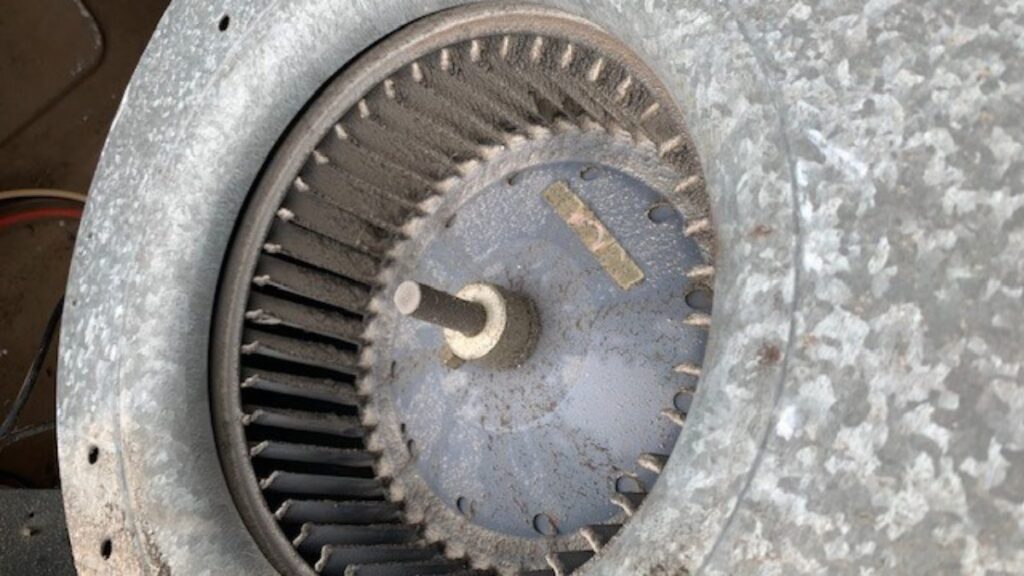
If you remember that crucial AC tune-up, our technicians can check your blower wheel and its housing for bio-growth and clean it.
3. Leaking Ductwork Developing Bio-Growth
Ductwork holes can lead to numerous problems for your indoor air quality. In terms of a musty odor, they can create an opening for harmful material to get inside. Furthermore, they can increase the humidity inside the ducts, resulting in a more significant breeding ground for bacteria.
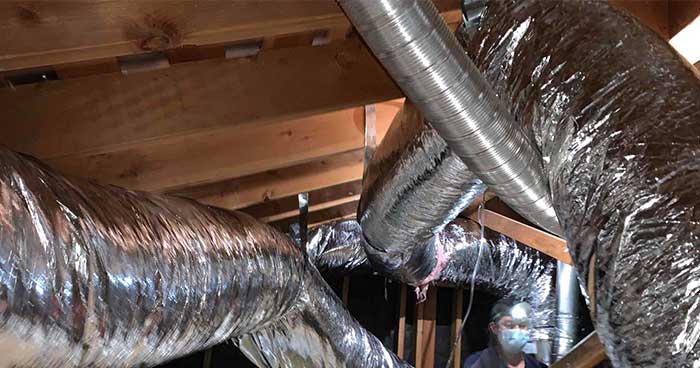
Additionally, extra holes in an air duct can let a lot more air out of your system, preventing your rooms from getting cooled properly and worsening your air’s humidity. You’ll need to have those leaks sealed if you want your house to be at the right temperature! Fortunately, you can call SuperTech for expert ductwork repair service!
4. Indoor Air Circulation
A well-furnished home may look pleasing, but as we mentioned, be weary of where you’re putting things. If you unknowingly block your return and supply vents with your furniture, it can restrict airflow through your house. And, of course, insufficient airflow leads to worsened humidity, leading to increased bio-growth.
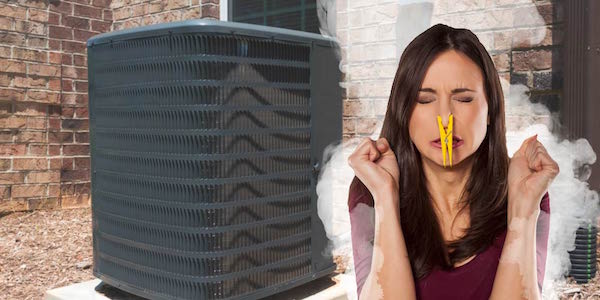
Moreover, many houses don’t even have return vents, preventing air from flowing as effectively as possible. So if you don’t have a return air vent, book a free estimate with SuperTech so we can give you some great pricing to install them!
5. Location Of Your System
It is not uncommon for indoor AC systems to be installed in the basements, attics, or crawlspaces of homes. What’s problematic about this, however, is that the temperatures and humidities of these areas are typically not regulated as well as other rooms. This is because these areas tend to be designed without return vents, meaning that the air’s humidity cannot get returned to the system. As a result, airflow immediately gets restricted around the unit, causing problems with the temperature throughout the rest of your house.
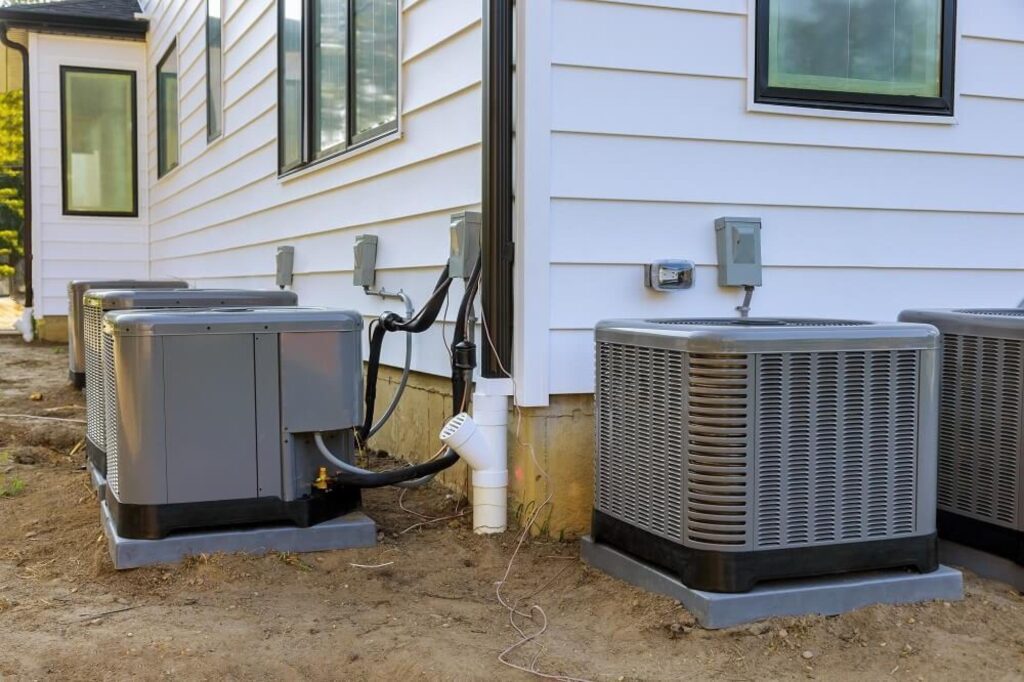
Alongside the location of your AC unit, if your house’s ducts are not sealed well, more bacteria could develop in your ductwork. And in some cases, excessive humidity in your home may even cause your ductwork to cave in on itself, rendering it useless!
6. Humidifier Is Not Maintained Properly
If you have a whole-house humidifier, it works in sync with your AC unit to maintain your house’s humidity, distributing water throughout the system and ductwork to create excess moisture in your home. So if it is not appropriately maintained, residual and / or standing water can cause bio-growth and other harmful bacteria to circulate throughout your system and home. In turn, there will be a wider area through your house for air to pick up musty stenches.
7. Dead Rodent In Your System Or Ductwork
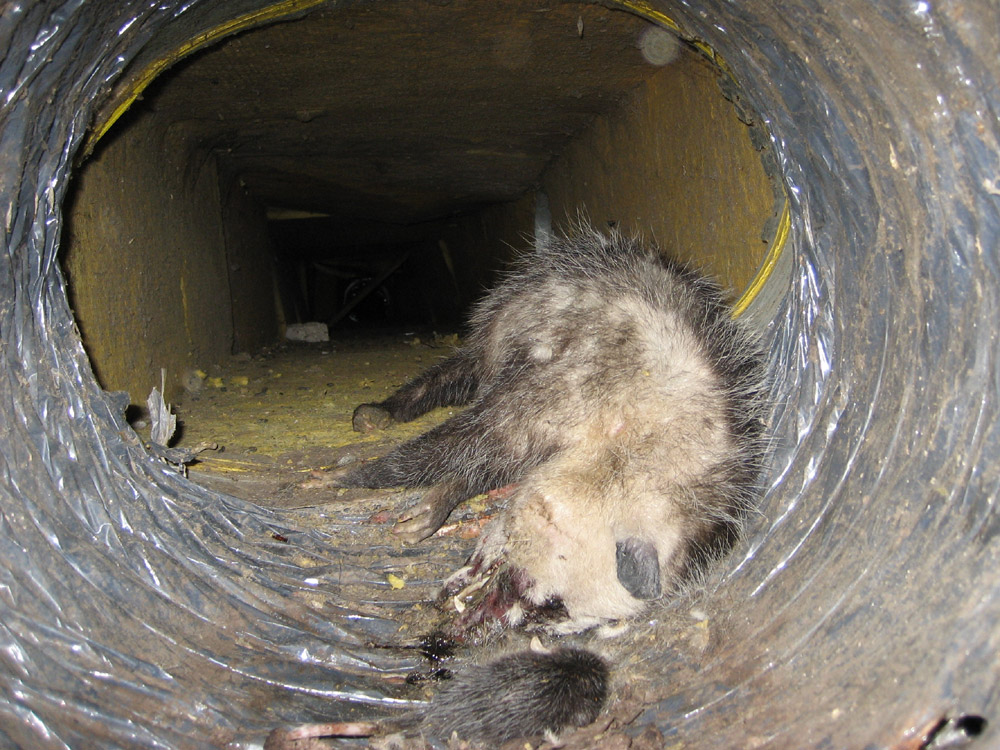
Mice, rats, and other rodents can often find their way into your ductwork through openings and die inside it because they cannot escape. And in some situations, they may take the wrong way when trying to get out, end up inside your AC system, and die. Either way, their corpses will become breeding grounds for bacteria, and your air will pick up their smell as it blows out into your house’s rooms.
8. AC Picking Up Musty Smell From Other Places
Of course, your AC unit isn’t the only feature of your house that can develop bacteria. There could be other spots where water leaks, animals have died, bio-growth is developing in dark and warm locations, etc. As a result, those smells begin to spread and link with your AC air, causing it to get distributed from its original spot to your house.
V- Some AC Smells Aren’t Problematic
A clean, properly-maintained, and well-functioning HVAC system should more or less be odorless. When running, it should not produce a noticeable smell. To put it more simply, an HVAC system that doesn’t have issues should smell like your house.
Of course, every home has unique smells, and not all unusual ones result from air conditioner problems. For example, if you cook dinner and burn food, your AC may pick up the scent and spread it around. Additionally, if you recently had construction done in your home, it could result in smells such as freshly cut wood or the natural odor of new electrical systems. Again, those smells may get in the path of your AC air.
Fortunately, as long as you don’t have harmful substances in your home or an allergy to what you are smelling, you shouldn’t have to worry about these scents.
And with that out of the way…
VI- How Do I Avoid Musty AC Smells In The Future?
As we said before, the best way to keep your AC from developing musty scents is to get maintenance at the start of Spring. This will allow a technician to clean any bio-growth and mildew off your system and check if there are places for bacteria to develop.
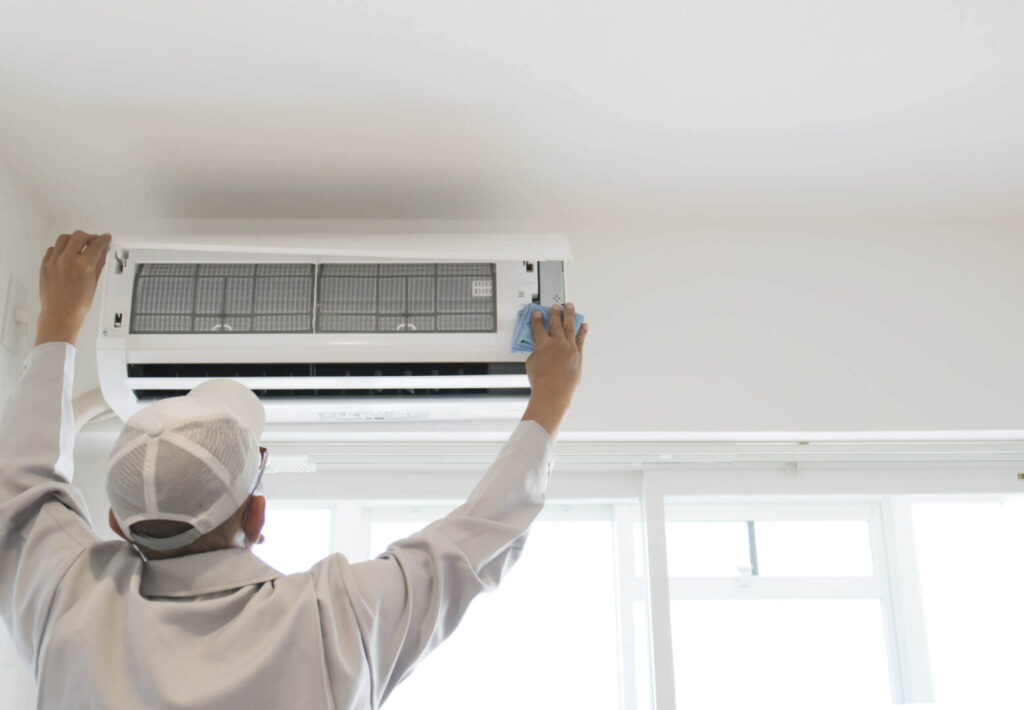
And if you choose SuperTech, you will get super thorough AC maintenance! To clarify, our technicians will bring a checklist of every component of your AC system so that they can inspect each one for unsafe material or potential spots where it could develop. Additionally, we can install an air scrubber to provide your system with more cleaning power!
Furthermore, having your house’s airflow tested and getting ductwork cleanings are also good ideas. Unfortunately, SuperTech doesn’t perform the latter service, but if you feel your ducts have become worn beyond repair, we can give you a free estimate and install new ones! Beyond this, you could schedule separate cleanings for your evaporator coil or your entire system.
And the ultimate prevention fix we can recommend is the installation of UV lights inside and outside your house. These lights control bio-growth development, reducing it from the start so that your home is a lot less likely to develop a musty smell. But remember that in a situation as severe as a dead animal in your system, these lights can only reduce bio-growth, not remove the animal. You will need a separate service for that.
VII- Ensure That Bad Smells Aren’t Turning You Off From Your AC!
Hopefully, you now understand the possible reasons why your air conditioner smells musty and how to prevent it. You’ll want that cool air blowing all summer long, so you don’t want to worry about an unpleasant mildew-like smell causing problems for your system!
And for all of you who reside in or around Baltimore, SuperTech is your best AC company! There’s a reason we’ve been reviewed positively over 300 times. We will show up on time with a smile, thoroughly inspect your system until we find out why it has a bad smell, and provide a customized solution that keeps your air conditioning unit working long-term!
Cre: supertechhvac



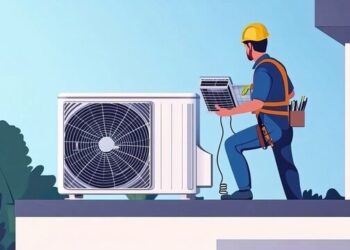














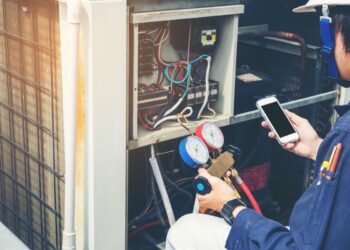
Discussion about this post